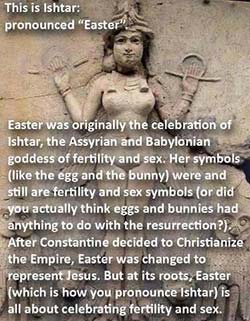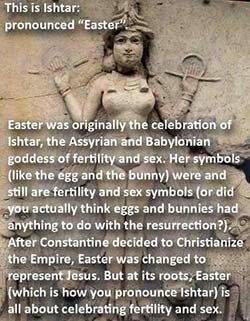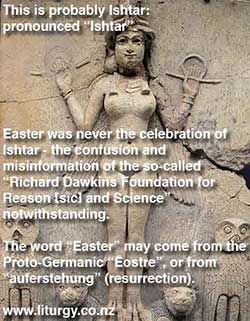 I have seen the image (left) more than once on facebook. It is, of course, absolute nonsense – misinformation from The Richard Dawkins Foundation for Reason and Science (Official) [sic] facebook page.
I have seen the image (left) more than once on facebook. It is, of course, absolute nonsense – misinformation from The Richard Dawkins Foundation for Reason and Science (Official) [sic] facebook page.
It has had 68,834 shares by people who uncritically follow a page that describes its mission as, “to support…critical thinking and evidence-based understanding…” OK; one final check: Yes the date of the image, 28 March, is not April Fools Day in any time zone!
Let’s look at these Dawkinsite claims with some real critical thinking and evidence-based understanding:
This is Ishtar. MOSTLY TRUE (or it might be Lilitu, Inanna, or Ereshkigal)
pronounced “Easter”. FALSE. “Ishtar” is pronounced… ummmm… “ishtar” [Hint for non-English, and Dawkinsians, there is no “sh” sound in “Easter”]
Easter was originally the celebration of Ishtar FALSE
[Ishtar was] the Assyrian and Babylonian goddess of fertility and sex. CONFUSED. Actually more of war and sex.
Her symbols (like the egg and the bunny). FALSE. The egg and the bunny are not associated with Ishtar. I don’t want to make it too complicated for Dawkins and his disciples, but for others: bunnies evolved on the Iberian Peninsula (that’s present-day Spain and Portugal for the non-academic) and didn’t spread from there with the Roman Empire to “Ishtar country” until well after the Ishtar myth was (literally) set in stone. Sorry Dawkins. Biology meet History (see pps to follow).
The majority position on the etymology of “Easter” is grounded in “Eastre” from Proto-Germanic “Austron” (Ēostre or Ostara). The alternative is that the source of the English word “Easter” is the German word for resurrection, “auferstehung”.
ps. the image presents an underlying mistrust of an approach which can find truth in a number of places – not just the Bible and Christian tradition, but in nature, and in myths and other religions.
pps. there is the ongoing issue that being an expert in, say, ethology and evolutionary biology one can suddenly present oneself as an expert on, say, philosophy and religion.
ppps. Just because Dawkins and his devotees are wrong about philosophy, religion, and Easter, that does not mean they are necessarily wrong about some of the things they actually know something about.
So here is the corrected image:
You can share the image on facebook here.
The HTML for adding the above badge to your blog or website is:
If you appreciated this post, there are different ways to keep in touch with the community around this website: like the facebook page, follow twitter, use the RSS feed,…





I like this a lot, though to be fair, the OED goes with the “dawn” etymology & also notes:
“Bede ( De Temporum Ratione 15. 9: see quot. below) derives the word < Eostre (a Northumbrian spelling; also Eastre in a variant reading), according to him, the name of a goddess whose festival was celebrated by the pagan Anglo-Saxons around the time of the vernal equinox (presumably in origin a goddess of the dawn, as the name is to be derived from the same Germanic base as east adv.: see above). This explanation is not confirmed by any other source, and the goddess has been suspected by some scholars to be an invention of Bede's. However, it seems unlikely that Bede would have invented a fictitious pagan festival in order to account for a Christian one."
Thanks for your visit and comment, “ELR”.
Firstly, on this site we use our ordinary name, please. [OK – I let that slip in allowing through some pseudonymous responses on the April Fools thread]. This is part of the positive culture here. Even when we disagree, we do so knowing that there is a real individual on the other side of the screen.
I am not at all sure what your point is. I explicitly source the word “Easter” as probably from Eastre – the quote from Bede you mention being important in that. So not the Dawnkinsian Ishtar source at all! In what sense, then, do you see me as not being fair?
Easter Season Blessings.
Even if there was some connection between the words Easter and Ishtar, which would be an incredible stretch. I think it’s only in English and German that the words Easter and Oster are used for the celebration of the Resurrection of Our Lord. In most languages it’s some version of Passover, i.e. Paques, Pasqua, Pascuas, Pascha.
Thanks, Thomas. It is not “an incredible stretch”. It is just wrong. Easter Season Blessings.
Not as wrong as you think, Bosco. The etymology is shrouded so I would want to categorize the way you do. One might end up in the falisy of affirming the consequent. Having said that, Dawkins usually spouts worse drivel. Ishtar gets swallowed into the Artemis/ Diana festival gets swallowed into Christianity is no stretch just a reality to deal with and have fun with. One should focus on the other supposed scientific drivel he purports as fact. The worst I heard was actually not Dawkins but the one who claims objectivity in science Stephen H. who claims that God could not have created the universe because there was no time to create it in. Such ignorance is appalling.
As I made clear, Geoff, I’m perfectly comfortable dealing and having fun with overlapping, interweaving, and cross-fertilisation of different stories, myths, and traditions, etc. But let’s not pretend that just making stuff up that sounds kind of right can be palmed off as reason, critical thinking, and evidence-based understanding. Next people will be saying that Estrogen (Oestrogen) originates from Eostre – and so is connected to Easter as well – when you and I both know that it comes from gadfly (Latin oestrus, Greek οἶστρος). When you demonstrate the Dawkinsian connection of bunnies to Ishtar, I’ll start being a bit less categorical 🙂 Meanwhile, Easter Seasons Blessings.
As you would know from Hebrew studies, Semitic languages have the Sin/Shin aspect to deal with. In this respect your writing on Ishtar is WRONG. Esther for instance is probably named after the goddess,Ishtar. The cows of Bashan ar in the BCP psalms the cows of Basan. It is quintessentially the shibboleth. One could go on ad nauseum but there is little point. Dawkins point however is not to be clear or reasoned but simply to generate propoganda and the Church has not done a good job at instructing about the traditions it has and also borrows and in doing so paints a large bulls eye on itself.
The connection would be Ishtar-Astarte-Artemis-Diana, all fertility goddesses with spring festivals and all transposable. That the name lives on would hardly be surprising, I am old enough to remember my grandfather saying By Jove, and I surely can’t remember there being a single temple to Jupiter anywhere near Northland New Zealand. It may be that Easter is a memory of Ishtar. It still doesn’t mean that Dawkins has a singular point worth considering
Thanks for making these very good points, Geoff. I think in the area of his own expertise, Dawkins has contributed some important thinking and explanations. Easter Season Blessings.
You actually wrote “let’s not pretend that making stuff up that sounds kind of right can be palmed off as reason”. But that is exactly what the church as done for two millenia. The creation of “saints” from local myths and falsehoods. The aggrandisement of the Papacy. The justification over centuries for slavery and the oppression of women, seeing them as property. And there is no procen origin of ‘Easter’, it’s not in the Gospels, and you can hardly attack Dawkins by saying ‘clue: there’s no sh in Easter’, then attribute the name to Eostre (clue for you: no O in Easter – so you are equally on shaky ground.
Don’t smugly and arrogantly attack others for their methods, then use them yourself.
Thanks, David, for your visit and comments.
If the church has pretended that making stuff up that sounds kind of right and palmed it off as reason, then, at those points it is equally deserving of critique. Including the aggrandisement of the Papacy. The justification over centuries for slavery and the oppression of women, seeing them as property.
I’m not sure what you mean by, “And there is no procen origin of ‘Easter’” – so I cannot comment.
You seem to (I would hate to think it was on purpose) have missed that I was responding to the assertion that Ishtar is pronounced “Easter”. It isn’t. Ishtar has a “sh” sound, Easter does not. I was not arguing, as you are, that the lack of certain letters means there was no etymological connection between Ishtar and Easter.
So I await your pointing out where exactly I am actually using the flawed Dawkinsian methods in my post. The alternative might be a retraction and apology from you for your last sentence.
Easter Season Blessings.
So that’s where it comes from. I’ve seen a number of people debunking the Ishtar-Easter connection over the past week or so, and have always been slightly confused as to why they were bothering to debunk something no-one outside a Dan Brown novel would ever claim.
So the Richard Dawkins Foundation has its origin in a Dan Brown novel? I suppose that’s as credible as thinking that Easter has its origin in Ishtar.
And Thomas Talley’s Origins of the Liturgical Year provides a basis for the dating of Christmas and Easter that isn’t the least bit arbitrary. These cocktail party analyses get increasingly tiresome for me. Thanks for providing an informed response to uninformed chatter.
Thanks for the encouragement, Allen. And, yes, Talley is always worth a read – thanks for reminding people here of him. Easter Season Blessings.
Of course if you are a little drunk you might pronounce Easter as Ishtar. Yesh, that musht be it.
Eccles, I found your comment in the “spam folder”. Although the practice of this site is to use your ordinary name, I was intrigued enough when I clicked on the linked site (which I had expected to lead to a non-existent page) to find that it is a real site with a surprising connection to my own (ordinary) name. I haven’t had time yet to look further at your site – but a quick glance showed me there is actually no connection with me, nor with this site. Easter Season Blessings.
If you look at it, there is no evidence that Dawkins has any control over what the Richard Dawkins Foundation etc etc (official) say on their facebook page, which is administered by a bloke who went to Notre Dame, spent a year at Maynooth, and went to UC Hastings, which is mainly a law school – none of which necessarily makes him an expert in the field. In terms of debates about religion, he is a bit of a soft target, and the question of Ishtar/Eostre/Easter and the evolution of bunnies all pre-date the choice by various religious leaders to interpret their texts in ways which endorse misogyny and “holy” wars – bigger problems than who stole Easter from whom surely?
Yes, Mike, the image we are discussing is not necessarily a direct quote from Richard Dawkins. That does not alter the value of discussing this image which went viral on the web. I must say I tire of the “there are bigger problems” approach. Yes, there are bigger problems. And they are worth discussing, etc. etc. etc. But that does not mean things other than the “bigger problems” not be discussed. Easter Season Blessings.
Thank you, Mike. I have been suspicious about this so called Richard Dawkins Foundation as legitimate. Is Mr. Dawkins even aware of it? It would be interesting to know if he has had anything to do with authorizing it. I’m expecting that Mr. Dawkins wouldn’t use Facebook as an approach for arguing his intelligent point of view!
Thanks, Francis. The so-called Richard Dawkins Foundation claims Richard Dawkins as its founder. Using what some might see as religious-type language it states “This is a movement, and Richard Dawkins is the catalyst that galvanizes it.” The facebook page is the one that is linked from the Richard Dawkins Foundation site. As well as founder, Richard Dawkins is listed as a trustee. Whether, as you say, Mr. Dawkins even aware of all this – I cannot comment. Easter Season Blessings.
‘If you look at it, there is no evidence that Dawkins has any control over what the Richard Dawkins Foundation etc etc (official) say’
it must be really annoying to have someone take over your work/writings/public persona and use it out of context etc! Even in support. I don’t like Facebook for many reasons but there are loads of pseudo-pages there devoted to various well-known people; maybe there’s now an internet term for that kind of ‘hijack’?
‘none of which necessarily makes him an expert in the field’
I don’t think there are many ‘experts’ in the whole field of theology or liturgy, it’s just so vast and within research or education people have tended towards a general apologetics
( which I don’t see as ‘academic’ unless it’s explicit, eg. ‘Catholic Studies’, etc. ) or they do an exhaustive concentration in a very narrow
field.
Most peoples were not literate until the 20th century ( many nations still are not ) so the elites of a society had ( have ) a monopoly on what gets taught/preached/written/re-written.
I actually think the Ishtar post represents 2 strong paradigms:
*the ‘little learning’ as significant to a developing country, for example in Medieval England the ability to recite passages of scripture which granted a Church trial rather than a secular court…or say here in the US today the test for citizenship which of course is simple to someone who knows English inside-out but when I went for mine I could hear people from various nations really struggling ( and being encouraged- many were elderly. Kudos INS )
One can practice a few bits of writing for a test or specific purpose- doesn’t mean there is a complete understanding or larger ability to use it.
*but going against a tradition or prohibition can also be the means to convey a strong message or challenge.
Imagine Jesus talking about eating flesh and drinking blood in Jewish culture, as a metaphor for his self-sacrifice.
That’s still taboo today.
*
As for Easter, my ( non-expert, long-trawled understanding ) is that at the 325 Council of Nicea there was a demand to create specific dates for festivals previously celebrated according to local ( ‘pagan’ ) traditions and the Jewish calendar.
Much as always based upon the seasons and experiences of people trying to survive them.
Seems a lot of commentary, indeed interesting commentary about nothing of any great significance. But is this the human condition.
Tracy Pace was significantly interesting. But I had this mad impulse to replace richard Dawkins etc with Jesus and Christianity in her first paragraph and following sentence. yes ‘out of context’.
In defense of the Eostre-Ishtar connection…
http://bahumuth.bitfreedom.com/defending-the-time-lord-goddess
Thanks, Jeff. That post claims that the Dawkins Foundation “retracted the picture”. Well it hasn’t. Then he continues, “But let me go out on limb and say that despite the fact that it seems like it’s an etymological impossibility, I do think there is a link between the names Ishtar and Eostre. I’m not completely alone in this….” Not a strong case, is it. Easter Season Blessings.
.
Actually, Easter and the Easter-egg came from the Egyptian Isis.
In Egyptian Isis was called Ast or Est, from which we derive Ester or Easter (referring to a star or the heavens). And remember that Isis-Est was a fertility goddess, as much as she was the Queen of Heaven.
And the Easter-egg came from the spelling, because Est was spelt with the easter-egg glyph. So yes, there are associations with fertility in the symbology of Est (Isis). Oh, and Ishtar (Isht-ar) came from the Egyptian Est (Isis), and not the other way around.
http://oi58.tinypic.com/29lmwrn.jpg
Ralph
(See: Cleopatra to Christ)
Thanks, Ralph.
To be clear for other readers: the book you are pointing to as evidence is your own, arguing that Jesus was the Great Grandson of Cleopatra. Jesus, according to you, was a son of King Abgarus of Edessa…
Blessings.